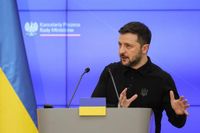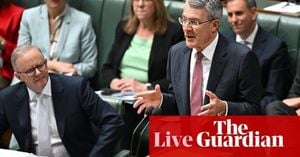Ukraine finds itself at a critical juncture as it faces mounting pressure to respond to a US-backed peace plan, with a deadline looming this week. This plan, which includes significant concessions from Ukraine, could reshape the future of the ongoing conflict with Russia.
According to a report from The Kyiv Post on April 21, 2025, Ukrainian officials are expected to provide their response to proposals initiated by the Trump administration by the end of the week. The upcoming meeting in London will bring together US, Ukrainian, and European officials to seek a unified stance before presenting the plan to Russia.
The proposals reportedly include Ukraine potentially abandoning its aspirations for NATO membership and recognizing Crimea as part of Russia. These concessions are part of a broader strategy aimed at finding a resolution to the conflict through negotiations, as detailed in a report by The Wall Street Journal.
Last week, a closed-door meeting in Paris saw high-ranking officials from the Trump administration, including Secretary of State Marco Rubio, present these ideas to Ukrainian representatives. The meeting included key figures such as Andriy Yermak, the top aide to President Volodymyr Zelensky; Defense Minister Rustem Umerov; and Foreign Minister Andrii Sybiha.
During the meeting, the US officials outlined a range of options for Ukraine, emphasizing that their proposals were not an ultimatum but rather a list of potential choices for Ukraine to consider. Nonetheless, Secretary Rubio stated that the Trump administration might pause negotiations if no significant progress is made in the coming weeks, urging Ukraine to respond swiftly.
These discussions come amid a backdrop of skepticism regarding Russia's intentions. Dmitry Peskov, the Kremlin spokesman, expressed caution towards anonymous media reports suggesting that Washington might formally recognize Crimea as Russian territory. During a press conference on April 21, he stated, "There is a lot of information circulating, and the search for a peaceful solution is not being conducted publicly. Anonymous statements should be assessed very carefully."
In 2014, Crimea was annexed by Russia following a controversial referendum, which the Ukrainian government and much of the international community do not recognize as legitimate. The current proposals from the US have been met with mixed reactions, as they include significant shifts from previous US policy, particularly regarding Crimea.
General Kellogg, another key figure in the discussions, stated that Ukraine’s accession to NATO is "not on the table," a move that may be aimed at alleviating Moscow's security concerns regarding NATO's eastward expansion. This new approach marks a notable departure from the longstanding US position opposing Russian claims over Crimea.
Another significant aspect of the proposals involves the establishment of a neutral zone around the Zaporizhzhia nuclear power plant, which could be placed under US supervision. This idea is seen as a potential way to ensure the safety of the facility, which is the largest nuclear power plant in Europe.
Despite the concessions being discussed, the US proposals do not fully align with some of Russia's core demands, such as recognizing Moscow's claims over four regions in eastern Ukraine that were annexed in 2022. Additionally, there are no stipulations in the proposals requiring the withdrawal of Russian troops from these areas.
Meanwhile, President Zelensky has reiterated Ukraine's position that it will never officially recognize Russian control over any territories. However, he has expressed a willingness to consider a ceasefire along the current front lines, where Russia controls approximately 20% of Ukrainian territory.
As diplomatic efforts continue, the Trump administration has yet to clarify whether it would support military assistance for European nations sending troops to Ukraine as part of a deterrent force. The Kremlin, for its part, appears eager to lift US sanctions and restore bilateral economic relations, seeking to negotiate these terms in both Moscow and Saudi Arabia.
In a statement to TASS on April 21, Peskov welcomed the US assertion that Ukraine's NATO membership is no longer under consideration, saying, "We have heard statements at various levels in the US that Ukraine's NATO membership has been ruled out. This is something that pleases us and aligns with our position."
As the deadline for Ukraine's response draws near, the stakes are high. The outcome of these negotiations could significantly impact the trajectory of the conflict in Ukraine and the broader geopolitical landscape in Eastern Europe. With both sides entrenched in their positions, the path to peace remains fraught with challenges and uncertainties.
In conclusion, as Ukraine navigates this pivotal moment, the world watches closely. The decisions made in the coming days could either pave the way for a peaceful resolution or prolong the conflict that has already caused immense suffering and upheaval.





